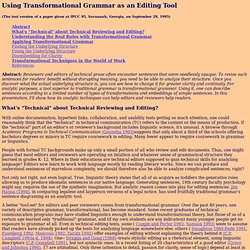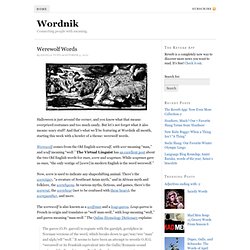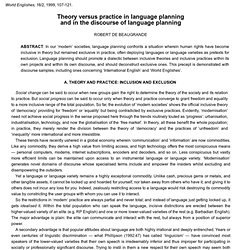

Related Article. Linguistics. Research Method. Language Conferences Worldwide Upcoming events in language, linguistics, speech and hearing therapy, translation, TESOL and related fields. English Around the World. Using Transformational Grammar as an Editing Tool. Using Transformational Grammar as an Editing Tool (The text version of a paper given at IPCC 95, Savannah, Georgia, on September 29, 1995) AbstractWhat's "Technical" about Technical Reviewing and Editing?

Understanding the Real Rules with Transformational GrammarApplying Transformational GrammarFinding the Underlying StructureFixing the Underlying StructureDisembedding for ClarityTransformational Techniques in the World of WorkReferencesAbstract: Reviewers and editors of technical prose often encounter sentences that seem needlessly opaque. To revise such sentences for readers' benefit without disrupting meaning, you need to be able to analyze their structure. Once you discover what the actual underlying structure is, you can see how to change it for greater clarity and continuity.
What's "Technical" about Technical Reviewing and Editing? People with formal TC backgrounds make up only a small portion of all who review and edit documents. Not only not right, not even logical. References. Wordnik ~ all the words. Halloween is just around the corner, and you know what that means: overpriced costumes and too much candy.

But let’s not forget what it also means: scary stuff! And that’s what we’ll be featuring at Wordnik all month, starting this week with a howler of a theme: werewolf words. Werewolf comes from the Old English werewulf, with wer meaning “man,” and wulf meaning “wolf.” The Virtual Linguist has an excellent post about the two Old English words for man, were and wapman. While wapman gave us man, “the only vestige of [were] in modern English is the word werewolf.”
Now, were is used to indicate any shapeshifting animal. The werewolf is also known as a wolfman and a loup-garou. The garou (O.Fr. garoul) is cognate with the garulph, gerulphos in Norman versions of the word, which breaks down to gar/war/wer “man” and ulph/wlf “wolf.” Loup-garou is a pleonasm, “a phrase in which one or more words are redundant as their meaning is expressed elsewhere in the phrase.” Discourse of language planning. World Englishes, 18/2, 1999, 107-121.

Theory versus practice in language planning and in the discourse of language planning Robert de Beaugrande abstract: In our ‘modern’ societies, language planning confronts a situation wherein human rights have become inclusive in theory but remained exclusive in practice, often deploying languages or language varieties as pretexts for exclusion. Language planning should promote a dialectic between inclusive theories and inclusive practices within its own projects and within its own discourse, and should deconstruct exclusive ones. Social change can be said to occur when new groups gain the right to determine the theory of the society and its relation to practice. Literacy - Intertextuality - Texts, Social, Text, and Task. A teacher asks students to find ways in which the stories "The Emperor's New Clothes" and "Chicken Little" are similar and ways they are different. A member of a book club compares last month's selection to the current month's.
A book review includes some of the dialogue from the reviewed book. People leaving the movie theater after seeing Lord of the Rings comment that the book was better. The movie Pocahontas is criticized by historians for misrepresenting established historical events. In each of these examples, different texts are brought together, related to one another, or connected in some way. Levels, Forms, and Functions of Intertextuality Juxtapositions may occur at multiple levels including word or phrase, sentence or utterance, larger units of connected text such as a paragraph or stanza, and genre. Intertextuality can be explicit or implied through a variety of literary devices (e.g., allusion, metonymy, synecdoche). Forums.
Translation. Internet Linguistics. "Literature and Science" (Matthew Arnold [1882]) Literature and Science by Matthew Arnold (1882)1 electronic edition by Ian Lancashire Practical people talk with a smile of Plato and of his absolute ideas; and it is impossible to deny that Plato's ideas do often seem unpractical and impracticable, and especially when one views them in connection with the life of a great work-a-day world like the United States.
!["Literature and Science" (Matthew Arnold [1882])](http://cdn.pearltrees.com/s/pic/th/literature-science-matthew-105645631)
The necessary staple of the life of such a world Plato regards with disdain; handicraft and trade and the working professions he regards with disdain; but what becomes of the life of an industrial modern community if you take handicraft and trade and the working professions out of it? The base mechanic arts and handicrafts, says Plato, bring about a natural weakness in the principle of excellence in a man, so that he cannot govern the ignoble growths in him, but nurses them, and cannot understand fostering any other. Nor do the working professions fare any better than trade at the hands of Plato. That is what is said.